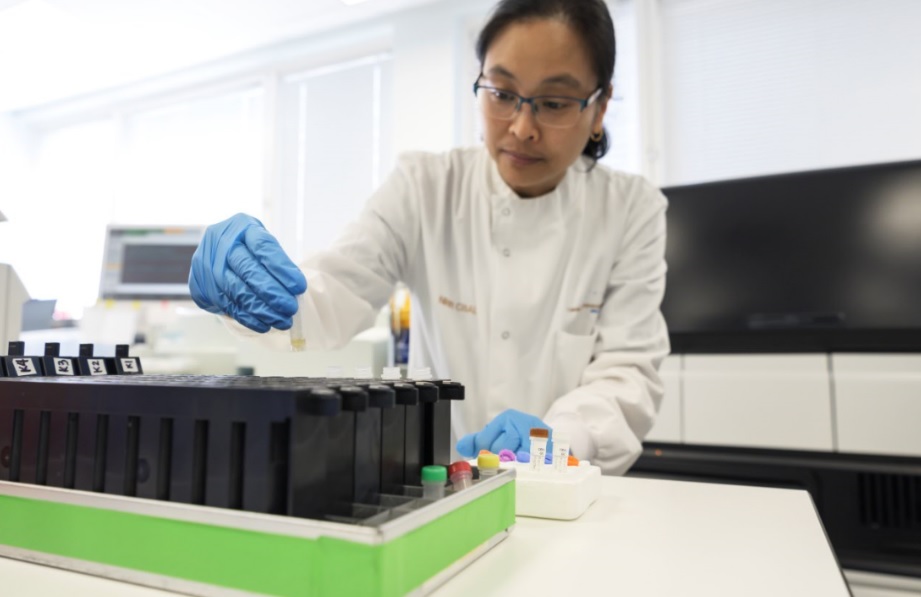Health Data Research at CUH
Cambridge University Hospitals NHS Foundation Trust (CUH) is a research hospital. Every day hundreds of our patients take part in clinical trials and other research studies, helping clinicians and scientists undertake research that improves healthcare for us all.
Health data research is an important part of our research, allowing us to answer questions that we may not be able to answer through other types of study (such as clinical trials). We can learn from this data to improve our patient care.
We would like our staff and patients to know about how routinely collected health data supports our research.
- Download the spreadsheet listing approved data studies (information correct as at 30 November 2024).
- Watch our webinar “Help shape health data research in Cambridge” (embedded below from our YouTube channel).


CUH supports the use of de-identified patient data for research to support improved patient care
Some of the research we support involves ‘routinely-collected health data’ – this is the information collected as part of normal patient care, such as what medicines or treatments a patient is having, and how long they have been in hospital.
Examples of routinely collected data
- Blood pressure measurements
- Blood test results
- Prescribed medications
- Surgical procedures
Why is health data collected?
CUH has used the e-Hospital system since 2014 to record patient information and support care. Every patient at CUH has an electronic health record (EHR), to securely store their information, including treatments, laboratory results and physiological measurements (vital signs such as blood pressure). Doctors and nurses use these records to care for patients – for example, to know when a patient needs their next dose of medication or how a patient’s blood pressure changes following surgery. Securely stored, accurate health data helps us to ensure that every patient receives the care that they need.
As well as individual care, patient data supports research. Researchers can look for patterns in the data that might point to better ways to deliver care, diagnose illnesses or design new treatments. Data used for research is subject to strict privacy and security measures to protect patients.
How is my data protected?
CUH has strict measures in place to ensure that patient data is always stored safely and used appropriately, whether for research or patient care. When patient data is used for research, the names, contact information and unique details that are linked to a person (such as their NHS number and hospital numbers) are removed from the data before it is analysed by study researchers. This process is called ‘de-identification’.
All research studies conducted at CUH must be approved by our Research and Development (R&D) Department who check that the research has the correct regulatory approvals, including assessment by the Health Research Authority and/or review by the NHS Research Ethics Committee service, when required.
The R&D Study Review Committee also carefully check all applications requesting de-identified patient data for research studies. This Committee confirms that any requests for data come from legitimate research organisations with qualified researchers, and that the proposed projects are likely to contribute to improved patient care. They consider whether the data requested is necessary for the proposed study and how it will be kept safe. A legal agreement known as a ‘Data Sharing Agreement’ is also signed by researchers, specifying that they can only use the data for the agreed purposes and cannot try to identify patients or share the data further. There are financial and legal penalties if these agreements are breeched.
Research with Identifiable Data
If researchers wish to use data containing details that could potentially identify an individual (known as ‘confidential’ information), they must make an application to the independent Confidentiality Advisory Group (CAG), administered by the Health Research Authority. The CAG may give special permission to use identifiable patient data under certain circumstances, including:
- where it would not be possible to use de-identified data, or to ask for the patients consent to use their identifiable data
- AND where the research has a clear patient and NHS-wide benefit
A list of studies which are approved to use routinely collected information without patient consent is available on the HRA website.
What can we learn from health data?
Research is vital for developing new and better ways to diagnose, treat and prevent illnesses. In addition to the outstanding clinical studies and trials we support, CUH are also proud of our research using de-identified health data. You can read some examples of data research being conducted or supported by the NIHR Cambridge BRC below.
How is this different from other clinical trials that I have been asked to join?
Clinical trials compare the results of different treatment approaches to help us understand the best ways to diagnose and manage illnesses. When you join a clinical study or trial, you will be given information about the study and how this might impact on your treatment. If you decide to take part in the study, researchers record data about you for that trial; sometimes this will involve collecting data from your EHR.
Health data research only uses your EHR and doesn’t need any extra information to be collected. Researchers can use this information once it has been de-identified to help answer important healthcare questions without any impact on your treatment.
Commercial/third party use of health data
CUH will sometimes share de-identified health data with other organisations if it is required to answer an important research question that will benefit the NHS, and patient privacy can be maintained. We support requests from researchers at other NHS Trusts and Universities, most often our partner the University of Cambridge. We also occasionally work with third parties such as charities and commercial organisations when the research meets the above criteria. CUH have strict processes to ensure that all data used in this way is de-identified, and securely transferred and stored. These procedures ensure that patient data is used safely and responsibly.
What can I do if I don’t want my de-identified data to be used for research?
CUH believe that safely and appropriately used health data is a vital resource to help improve patient care, and we have already made important discoveries using this data. To ensure that our study results reflect all of our patients it is very important to include data from many different people; we would ask all patients to consider supporting us in this.
If you are not happy for your de-identified data to be used in this way, the NHS allows you to opt out. You can read more about it here: To opt-out of data sharing, please visit NHS UK.
Can I get involved?
Would you like to have a say in, or contribute to, the research that we do? All the data used in our research comes from patients, and we would like patients to become more involved in the research that we do. Public and patient representatives review every research project we undertake using routinely collected patient data. If you would like to be involved, please contact our PPI team.
How can I find out more?
The following websites have further information that may be of interest:
The Information Commissioner’s Office
If you would like more information about how your information is protected at CUH, please see the trust’s patient privacy webpages.
If you would like more information about our health data research studies, please email cuh.dataesearch@nhs.net
“The Cambridge BRC’s multidisciplinary capacity building team provides support and guidance to our various activities. If you would like to contact a member of this team please follow the links below.”


